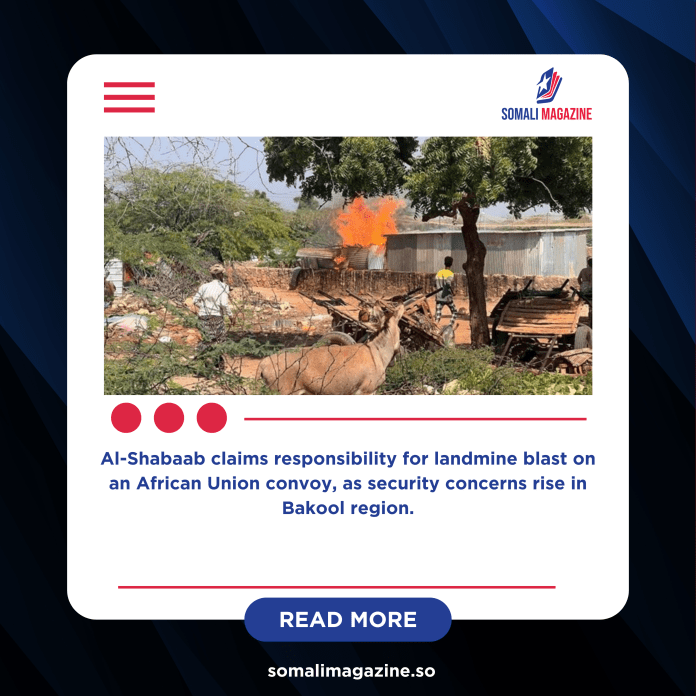Facebook Twitter (X) Instagram Somali Magazine - People's Magazine
A convoy of Ethiopian soldiers serving in Somalia came under attack on Tuesday when a remote-controlled landmine exploded in Waajid district, located in the Bakool region of southwestern Somalia. The incident highlights the ongoing dangers facing African Union peacekeepers in the country, where the militant group al-Shabaab continues to wage a violent insurgency.
According to security sources, the roadside bomb struck vehicles transporting Ethiopian troops who are part of the African Union Transition Mission in Somalia (ATMIS). The blast was followed by an exchange of gunfire, as soldiers quickly secured the area and blocked traffic along the road. For several hours, movement was restricted while the troops attempted to control the situation. Eyewitnesses reported seeing smoke rising from the site of the explosion before the convoy later withdrew from the scene.
Al-Shabaab, the extremist group linked to al-Qaeda, claimed responsibility for the attack. In a statement released on its propaganda channels, the group alleged that at least three Ethiopian soldiers were killed and four others wounded. The militants also claimed to have destroyed one of the military vehicles in the convoy. However, these claims could not be independently confirmed. Neither Ethiopian military officials nor the South West State administration have issued a statement regarding the incident.
The attack in Waajid reflects a familiar pattern of violence used by al-Shabaab, which often relies on improvised explosive devices (IEDs), landmines, and ambushes to target security forces. These methods are designed to inflict maximum casualties while limiting the group’s direct exposure to combat. Over the years, such tactics have proven deadly, not only for foreign troops serving under the African Union mission but also for Somali government forces and civilians caught in the crossfire.
Waajid district itself has been a flashpoint for conflict due to its strategic location. Situated in Bakool, the town has seen repeated clashes between government-allied forces and al-Shabaab fighters seeking to assert control over the region. By targeting Ethiopian soldiers in this area, al-Shabaab sends a message that it can strike even in places where African Union troops maintain a heavy presence.
The incident comes at a time when the African Union Transition Mission in Somalia is working toward handing over security responsibilities to Somali forces. ATMIS, which replaced the long-standing AMISOM mission, is gradually reducing its troop presence in the country under a timetable supported by the United Nations. However, continued attacks such as the one in Waajid raise questions about whether Somali forces are fully prepared to take over the task of securing vast regions still vulnerable to militant threats.
For Ethiopia, the attack is a reminder of the high cost of its military involvement in Somalia. Ethiopian troops have been a central part of AU-led operations for years, helping to push al-Shabaab out of major towns and cities. Yet, they remain frequent targets of the group’s insurgent campaign. The militants view foreign troops as obstacles to their goal of toppling Somalia’s government and imposing their strict version of Islamic law.
While the full number of casualties from Tuesday’s explosion remains unclear, the event underscores the persistent threat posed by al-Shabaab in southern Somalia. Despite years of international military operations, the group continues to adapt and launch deadly strikes against both Somali and international forces.
As of now, no official response has been issued by Ethiopian authorities or local government officials regarding the Waajid incident. Until further details emerge, the attack serves as another reminder of the difficult path Somalia faces in achieving lasting peace and stability.

